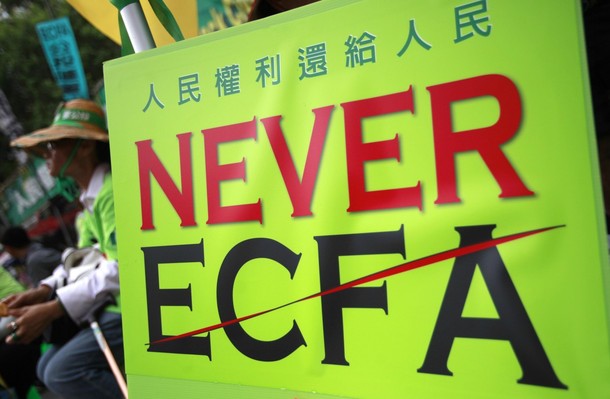Taiwan president faces hurdles in key China deal

Associated Press | 4 June 2010
Taiwan president faces hurdles in key China deal
By DEBBY WU (AP)
TAIPEI, Taiwan — Taiwanese President Ma Ying-jeou is facing domestic and Chinese hurdles in his pursuit of a key China trade pact that could bring about the closest relations between the longtime rivals since their split amid civil war in 1949.
Recent public polls have suggested Taiwanese people are divided about the pact, which could dramatically alter Taiwan’s future. Earlier this week Beijing appeared to slap down Ma’s argument the agreement will remove Chinese resistance to Taiwan’s efforts to seek similar arrangements with other trade partners.
The main opposition Democratic Progressive Party said it would hold a mass rally against the pact this weekend, after its call for an island-wide referendum on the issue was rejected by a Cabinet committee. Party leaders have said the deal could threaten the island’s political independence and make its economy overly reliant on China’s — the world’s third largest.
Despite the obstacles, the cross-strait pact is almost certainly going to be signed this year, with the Ma administration repeatedly pledging to see it through in June. However, it remains unclear whether the highly contentious deal will garner support from the majority of Taiwanese people and secure Ma re-election in 2012.
The China accord, which is commonly known as the Economic Cooperation Framework Agreement, is the jewel in the crown of Ma’s ambitious China engagement program.
It seeks to add momentum to Taiwan’s already improving relationship with China, reducing tariff barriers and liberalizing investment regulations. Taiwan officials say the pact will help increase Taiwan’s economic growth rate by about 1.7 percentage points.
Ma has claimed the pact is necessary for Taiwan’s economic survival.
"We have already fallen behind in the process of regional economic integration among Asian countries," Ma said in January. "Things will worsen if we don’t change the situation."
Recent polls have shown a significant number of Taiwanese remain doubtful about Ma’s claim, and a majority of voters support the opposition’s call for referendum.
Taiwan’s cable news station TVBS found 55 percent of Taiwanese want the referendum. It also found while 41 percent of Taiwanese support the pact, 34 percent reject it. That poll, conducted by telephone among 1,004 people on May 31, had a margin of error of plus or minus 3.4 percent.
The Taiwan opposition says with China fully committed to bringing Taiwan back under its control, what is needed is less economic contact with China rather than more.
"China is an undemocratic country with political ambition toward Taiwan, so we certainly cannot entrust our future in China’s hands," said main opposition Democratic Progressive Party Chairwoman Tsai Ing-wen in May. "The pact concerns Taiwan’s future and next generation, and we would like to have a referendum on such an important issue."
Despite the 1949 split, Beijing continues to claim Taiwan as part of its territory, and is determined to reunite with Taiwan.
The Taiwan government is expected to reach a decision later Thursday whether to allow the referendum.
While Ma has been working hard to improve China ties, Beijing has not always reciprocated his good will.
On Tuesday, China even appeared to thwart Ma’s defense for the trade deal. China’s Foreign Ministry spokesman Ma Zhaoxu said Beijing "firmly objects to any official exchanges Taiwan has with China’s diplomatic allies" in response to a question on whether the cross-strait economic pact would help Taipei pursue other free trade agreements.
Beijing’s statement has been widely regarded as a major embarrassment for Ma. Still, Ma only offered a mild response.
"It is a right of the members of the World Trade Organization to pursue free trade agreements with each other, so Taiwan should not face any interference when exercising such a right," Ma told a ruling Nationalist Party meeting Wednesday. "I have also urged China not to prevent Taiwan from signing free trade agreements with our major trade partners."
Both Taiwan and China are WTO members.





